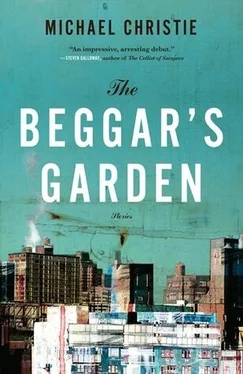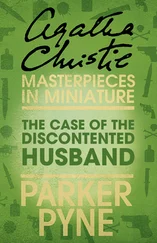In court, bandages swelling his shirtsleeves, Saul saw that she wasn’t hurt and was relieved. Mostly, she hung her head, big tears tapping more codes on her skirt. When she was finally asked to speak, there before her parents and the jury, she was too afraid to face the truth of their secret communication. When Saul spoke to comfort her, to assure her she needn’t be ashamed, the judge thundered in his direction. When Saul ignored him, he was whisked from the room and stuck with needles that filled his mouth with sand. After the trial was over, he’d asked his lawyer her name. The lawyer pursed his thick lips, thought for a moment, then told him it was Ada Plinth. He was eighteen years old. Saul had probably written her thousands of letters since, unaddressed, just her name in the centre of each envelope, all to no reply.
The memory now displayed to him so vibrantly, Saul was able to see he’d done nothing evil, or horrible, or unforgivable, nothing that could justify incarceration on the ward for the rest of his days. It had been Ada’s wish they’d been caught; she had panicked, and he’d accepted the punishment to preserve her dignity. Saul now could see the bitter hollow of remorse he’d inhabited over the years and hated Kraepevic for having convinced him to call it his home. It then became clear to Saul that such a diabolical foe as Kraepevic wouldn’t have made it his life’s work to persecute and torture him if there wasn’t something fundamentally important about Saul, something epic and dramatic, something innately good and worth destroying. He’d always suspected he was meant for great things and perhaps it was this very same fatedness that had drawn Ada Plinth to him, and had kept him from prison, and had protected him and guarded his sanity under Kraepevic and the Assassin’s plot to poison his mind. And it was perhaps this same goodness that had led him here, to this new apartment. As he warmed to this idea, he felt the blue chair in which he sat throb beneath him like the cockpit of a powerful machine. But was he dangerous? He certainly wouldn’t be if he lived here, free from poison pills and the cruelty of the other patients, with nobody scheduling him or scribbling about him in a binder.
It was settled. He’d never lived on his own but he’d learn. He’d keep the place clean, draw up a routine of chores for himself and, of course, he’d still return to Centre Lawn for bingo, the occasional hot meal or checkers match with Kim. Saul’s mind soared like this for a while until it was grounded by his stomach — he hadn’t been eating much since he’d spotted Luis mucking about in the cafeteria. His pass was probably up anyway, so he rehung the robe, got dressed and made sure the door didn’t lock.
The ward always smelled foreign after he’d been away, but this time it was startling: discount cigarettes, crayons, messed pants and bile curdling on the warm air. Bad as they were, the smells failed to bother him. He looked upon the whole ward as if from a high place, as though he were still in his white robe gazing out on the river. He saw Tina, Drew, Kim and all the other patients lining up for dinner and he pitied them. But he couldn’t take them with him; the apartment was too small.
After dinner, a salubrious feast of noodly casserole, Saul approached the bingo table, a folding thing the staff set up each time. With Jacob still languishing in the Quiet Room, Saul knew his bingo victory was certain. Jacob always won. He never missed a number, due to a youthful concentration that hadn’t yet been whittled down by meds and the lack of things to concentrate on. Saul vowed to put his jackpot toward supplies for his new place: food, candles and an alarm clock, because he’d need to wake early to perform chores when the staff wasn’t there to rouse him anymore. Saul thumbed the stack of cards, trolling for vibrations. In bingo, the selection of a card was the only aspect you could control; the rest was just making sure you didn’t mess up. He sensed the aura of a winner and fetched a paper cup of pennies. They didn’t allow dabbers so the patients placed coins to mark the numbers called. A whole card was accidentally dumped at least once each game. Whoever dumped their card was usually dragged to the Quiet Room for a while to calm down.
The Dayroom was placid even with all the patients loaded in there. Saul marvelled at how much less insane they were on bingo night. There was a focus, a common purpose, or maybe it was just that everybody wanted to win. The lack of seating forced him next to Georgina, within range of the flailings of her elbows. Frieda, a tense, dead-eyed nurse, sat to the left of Georgina’s wheelchair to place her pennies for her, sure to raise serious questions of fairness if she ever won, which she never did because she was terminally unlucky. All she’d ever seen was spoons shoved toward her and TV she’d never understand and someone dropping pennies on a card of nonsense in front of her. Saul read her mind for a moment and it made no more sense than the babblings of a child. He’d have room for her at his apartment, but he didn’t know how to care for her, to change and feed her, and this saddened him.
Suddenly, the sphere of wire commenced churning the numbered balls. The Assassin was cranking the handle, grinning to the crowd like a Caesar. They locked eyes. Saul almost quit right there; he knew the Assassin would never let him win.
“Eye-thirty-seven. Eyeeee, thirteeeee, sevennnn …” he said, holding the first ball aloft, appraising it like a jewel.
Saul had I-37 and placed his first penny.
After that, Saul knew each number the Assassin was going to pick before he picked it. He and the Assassin were communicating telepathically. It was a covenant. Luis wanted Saul to win. And he did. He had the next three numbers after that — including the free space — and was first to get a line.
“Bingo,” Saul said, and Luis checked his card.
“We have a winner!” he said, shaking Saul’s hand with vigour. The first prize of the night was little bottles of shampoo and a new toothbrush.
“Keep it coming,” Saul said, and cuffed Luis playfully on the shoulder. Luis winked and brandished his huge, beautiful teeth.
Saul was next to get two lines, then a plus sign, which earned him a hairbrush and some new black socks. The other patients grew suspicious.
“You win too much, Saul,” Tina said from a few chairs over.
“The fix is in the house coat of arms,” Drew said.
“About time,” Saul said, returning to his seat with a foam goblet of decaf coffee for the final round. He was an athlete on a streak, an accidental millionaire, the king of one of those microscopic countries you can’t find on a map but know are somewhere.
“Okay, ladies and germs, this one is called Blackout, and it’s for the whopping cash prize of five bucks,” Luis said, turning the handle, hamming it up like a showboat caller. His entire demeanour had changed. It seemed inconceivable to Saul that Luis was once the sort of man who’d pitch someone from a helicopter. Perhaps he’d fallen out with Dr. K., or maybe he really was a psych nurse.
Luis called every number on Saul’s card except for I-25, which he remembered as two of the numbers on his apartment door, so he wasn’t worried. Then Luis spoke some numbers Saul didn’t have. Saul wasn’t concerned; he only needed one. Saul began broadcasting I-25 with his mind and could see blue brainwaves bending the air between them.
Luis called more bad numbers. Then more.
The grids of the other cards were filling with pennies.
Saul felt a blackness gathering in the room. “I-25!” he heard his voices threaten all at once.
“Would you sit down, Saul?” Kim said.
Luis regarded Saul and shrugged. There were only about six balls left. He pulled another and read it.
Читать дальше












